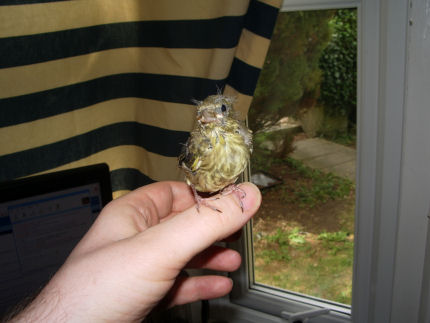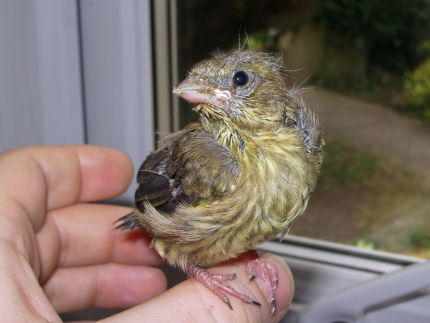Sound And Pictures
by John Walker on May.04, 2007, under The Rest
I’ve come over all multimedia.
PC Gamer have officially launched their shiny new podcast, the first episode featuring cuddly little me. It’s remarkably fun. I fear that I might be a bit boring. (And in the game).
And I appear very briefly in the latest EGTV, sounding remarkably positive about a game for which I feel only apathy. Editing, eh?
Hip Replacement
by John Walker on May.01, 2007, under The Rest
There are regions of Chicago for which I am not nearly hip enough. I have been introduced to them by those who qualify, and then have naughtily snuck back to enjoy their wares privately, despite falling woefully short of the requirements.
One such place is a coffee shop in Wicker Park (well, let’s face it, the whole of Wicker Park is somewhere I shouldn’t really be) called Earwax. See, by name alone it should be obvious to any that someone of my nature – not geek enough, not cool enough, not street enough, not skater enough, not smart enough, nor dumb enough to fit into any appropriate niche – should be keeping well away. Of course, I want to visit such a place. And not because it’s hip – that, if anything, makes me feel uncomfortable. I want to visit it for it’s peculiar combination of dingy lighting and brightly coloured furniture, the generous service and the decent food and drink. I like that it’s so odd-looking, but it’s that very odd-looking-ness that renders it hip beyond my means.
As I sit facing the open front of the store, watching the sort of people walking past who really ought to be in such an area, I notice that the music playing is Devendra Banhart. I’ve not heard this particular album (but since he releases about five a day, that’s not too surprising), and I concoct the plan that I could ask my extremely hip waitress whether this is Devendra Banhart. I’d be slightly unsure, and she’d say, “Yes! It is! You recognised Devendra Banhart, who is a hip singer, and as such are now welcomed into our fold as one of the Hip People.” She would then tell the other staff that I was now to be recognised as hip, and I would presumably receive some sort of appropriate in-house discount.
Another member of the staff put out some napkins on a table near mine. I looked at him, then back at my book, then back at him again certain that something was wrong.
This man was no more hip than I. If anything, he was more plain, more implanted in the background than I could claim – how could he possibly have the sheer cheek to have a job here? Here in Earwax, in Wicker Park?
And then I realised. This man – this genius – was beyond anything my simple mind could grasp. His presentation, his lack of hip, was a carefully cultivated style, perfected over years, until he had reached this zenith of an anti-hip appearance. He was, by far, the most hip man in the area. He was their king.
I didn’t ask about the music, but instead paid my bill and left.
High School High
by John Walker on Apr.27, 2007, under The Rest
I’m on a television set.
That’s not strictly true, in as much as it’s a lie. I’m in a Chicago high school, sat in the corner of the room while Kim teaches an English class. And yet, I feel as though I’m on a television set.
You would think that there would be enough in common between schooling across the Atlantic that a classroom would feel like a classroom, but despite all the commonalities, there’s still something completely distinctive, alien even, about the American High School Experience.
Long, stretching corridors lined with tall, thin lockers are set dressings for a high school drama, rather than objects appearing anywhere in real life. There’s school, and then there’s pretend American school from off of the telly. To step inside this doesn’t shatter the mythology and reveal it as reality, but rather absorb you into the mythology itself.
Somewhere, between the bells ringing and the class immediately leaping out from behind their individual desks while the teacher shouts last minute instructions over the ruckas, and loud intercom buzzers preceding drawled announcements for such-and-such to go to the principal’s office, there has to be a blonde teenage private investigator solving intricate crimes, and a floppy-shirted disgruntled girl dying her hair red and lusting after Jordan Catalano. It’s certain that the unnaturally giant fifteen year old boys strolling on their way to football practise will be taking part in a game against the local rivals which they will be losing until the final few minutes, when their grumpy, overweight coach comes up with a new tactic that’s so crazy it just might work.
The class banter, lively and impressively funny, is surely scripted. They are the cleverly constructed lines from a writer who later plans for their wit to be used in the face of surly vampires or young superheroes. And which of these students are going to meet grisly and unpleasant deaths at the blade of a cloaked, crazed and perhaps supernatural killer?
How peculiar for this cast of extras to be seemingly unaware of their Truman-like existence, believing themselves to be studying here for a reason, seeing their existence reaching college, and then even regular adult life, rather than the early cancellation that inevitably awaits. Or perhaps these will be the lucky ones, seeing their stereotyped roles re-realised in a college setting, with even their principal coming along to run a local bar.
His Majesty Returns
by John Walker on Apr.23, 2007, under The Rest
I’m off to the capital city of America, Chicago, to check on my royal grounds.
I’ll be back a week Friday, but completely available by email.
If I owe you work, QUICK! Look over there! For quite a long time!
Welcome To Bollywood
by John Walker on Apr.20, 2007, under The Rest
Does anyone know why the BBC News website is so focused on Bollywood?
Today one of the top three biggest stories in the world, on the front page, is apparently a story about two Bollywood actors getting married.
Am I completely out of touch, and Bollywood has become a massive deal in the UK, bigger than Hollywood?
Or is there something more peculiar going on? Does the BBC hugely invest in the Indian film industry?
I don’t care either way, resigned as I am that stories about Madonna adopting Angelina will be considered important enough to reach the front page, and so it might as well do the same for any film industry of any country. But the Bollywood theme is recurring, while French, Australian, Italian etc industries are all but ignored, and I’m intrigued to know why.
Television: Thank God You’re Here – NBC
by John Walker on Apr.19, 2007, under Television
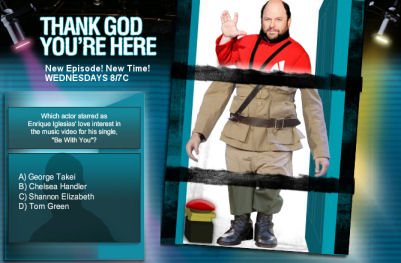
Televised improv has only ever worked once. And then, it only worked a bit. Whose Line Is It Anyway is an interesting creature, beginning on Radio 4 as a faux intellectual nonsense, then transfering to Channel 4 with the same crew – Stephen Fry, John Sessions, etc, before wading through Tony Slattery and Sandy Toskvig and then finding its best fit with a near all-American cast. It was then natural for a US network to pick it up and start making it for themselves. However, it couldn’t go that smoothly, and naturally changes were made. Clive Anderson’s falsely befuddled nature, and quick-witted cruelty provided an excellent straight man for the hyperactive silliness on stage. Drew Carey’s desperation to be involved created a constant tension, peaking when he leapt from behind his desk to shout along with the rest. But worse, far worse, was the programme’s desperation for you to know that it wasn’t scripted. Yes – we know – it would be a lot funnier if it were.
It’s as if improvisation is some sort of mystical paranormal ability that the audience is deeply skeptical about. “They couldn’t possibly have made two words rhyme if they hadn’t had a team of writers working on it for weeks! This must be FAKE!”
Thank God You’re Here is an Australian import that NBC has no idea how to handle. It’s a simple improv game – take an actor or comedian, put them in a costume, and have them walk through a door into a scene they know nothing about. They have to cope with whatever the cast do or say until the klaxon sounds. It’s a good concept, and there’s no reason it shouldn’t work. Were it not for the desperation to boast that they have “no idea, you’ve no idea, no idea at all…” about what’s going to happen. Constant declarations of how “dangerous” it is, how it’s “an actor’s greatest fear”. As if not knowing what was going to happen next, or what everyone else was going to say, weren’t how real life works. The real pressure, the real fear for those participating, is to be funny.
This needy nature spreads to host Dave Allen Grier, who if given free reign can be fantastically funny. It’s the good old irony of having an excellent improviser constricted by trying to remember his awkward lines. Trying so hard to create an atmosphere of tightrope walking over rabid sharks, Grier generates an all-permeating insincerity that drags the potential of the show down with it. Co-hosting, and psuedo-judging the performances, is the lovely, cuddly Dave Foley. Far better, he cracks wise after each sketch, but then says that everyone was “hilarious”.
The show finishes with all four in one scene, which until the third episode was a completely unfunny disaster, suddenly made hilarious by the complete descent into crazed kissing leaving DAG clueless about what to do. Which is not a criticism, really. He can’t have been expecting Shannon Elizabeth to start smooching one of the regular male cast, only to be upstaged by George Takei doing the same, then upstaged once more by Dave Foley leaping from behind his desk, rushing the stage and kissing the man while Elizabeth began snogging Tom Green, and then eventually poor, confused DAG. (Shannon Elizabeth then realised her mistake and kissed Foley, remembering he was the judge).
Er, so impromptu orgies aside, it’s as hit and miss as improv always will be, and only enjoyable if you can swab the treacle of gushing bravado from your mind and enjoy each sketch alone. It’s interesting who copes well. The choice of guests has been intelligent so far, picking people with a decent background in either comedy or improv. Both Jennifer Coolidge and Jane Lynch from Christopher Guest’s improv film troop have appeared, as well as Jason Alexander, Brian Posehn, and Tom Green. However, oddly, none of them did particularly well. Coolidge resorted to her Best In Show character when asked to be a beauty queen, and copped out of most moments for genuine improvisation (but for one exellent moment – when asked what she would like to eradicate from Earth, she replied immediately, “dry ice”). Lynch was given a poor scenario, as a teenager rumbled for having a party by her parents. Posehn couldn’t cope at all, and it’s a real surprise they left his scenes in the show, with him standing still looking terrified, then giggling. Green and Alexander were both fine, but each resorted to type, Green shouting and climbing the sets, Alexander crowbarring in a reference to Seinfeld.
Far, far better, and perhaps unpredictably, were Bryan Cranston, Wayne Knight, Chelsea Handler, and Joel McHale. Knight was surprisingly quick, and constantly funny. Chelsea Handler was almost too confident, slick and rude, scaring the regular cast. McHale, who seems genetically designed to be hated, was really very funny as an Egyptologist, and controlled his scene impressively. But best so far has been Bryan Cranston (which is a bit of a shame, as he was the first to go in the first episode), who shedded any Malcom In The Middleness he might still have, and was absolutely hilarious. And not just because he too smooched every member of the cast.
So you end up with a hit to miss ratio unfortunately balanced the wrong way. When it hits, it’s great, but the rest of the time it’s flaying awkwardly, especially without the support of a confident host. (Which makes no sense – DAG on anyone else’s programme will take over completely, dominating normally to humourous ends). Bumpering the sketches are a couple of pre-taped scenes which are used to “warm up” the contestants the previous day. These are edited together well, each of the four taking part in the same scenario, one after the other, the funniest moments cut together to create a single run through of the scene, jumping between each actor’s take. This trims the lack of laughs out completely, and so far all six of these have been very funny. They, bizarrely, are the model for how television improv should be produced, but instead are used as throwaway moments between the over-hyped and less funny live sketches.
Preview: Hour of Victory
by John Walker on Apr.19, 2007, under The Rest
Comments Off on Preview: Hour of Victory more...Television: This American Life – Showtime
by John Walker on Apr.19, 2007, under Television

I almost don’t have the words.
I feel like if I write this badly, I’ll break it. Like I might break the spell, and it won’t exist any more.
This American Life has been a radio programme broadcast on Chicago Public Radio, and syndicated on public radio stations across America, for a decade. You can hear it here. Each week, as presenter Ira Glass would say, they choose a theme, and bring a variety of stories on that theme. It’s about the intricate details of people’s lives, the specifics that make them them, rather than you. It’s almost unique in not trying to identify with its listeners, but rather simply asks you to be interested in someone else.
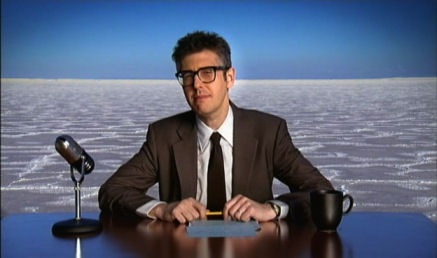
A British reference point would be Home Truths, presented by the late, and missed, John Peel. Both programmes shared a gentleness that’s almost impossible to find anywhere else. And neither did this at the expense of honesty. Difficult, painful stories are as at home as amusing or uplifting tales. John Peel died, and, eventually, Radio 4 gave the programme the dignity to let it die with him. Fortunately Ira Glass is alive and well, and so This American Life continues.
Taking radio to television is a process that requires grace and intelligence. Or more often, reinvention. This American Life opts for the first option in an unparalleled fashion. It is radio with pictures. Really beautiful pictures.
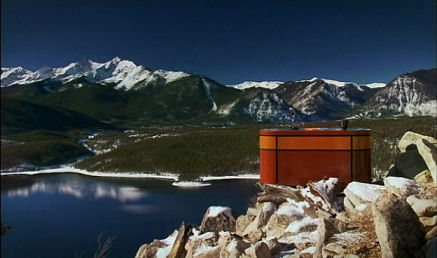
Mimicking the radio programme’s format, an episode begins with a short interview or report, and then an introduction from Glass declaring the loose theme for that edition. On the television programme, he sits at a simple wooden desk with a microphone, perhaps on the side of a mountain, in the middle of the desert, or in an underground carpark. The Python reference seems quite deliberate, but simultaneously explains Glass’s role in the proceedings – a man separate from the events.
Perhaps a great testament to the programme is that it took me four episodes to realise that it was only half an hour long. The deliberate and composed pace provides so much precise detail that it feels as though it must be closer to an hour. To fit in three stories, each leaving you feeling intimate with the subjects, in such a short time is astonishing.
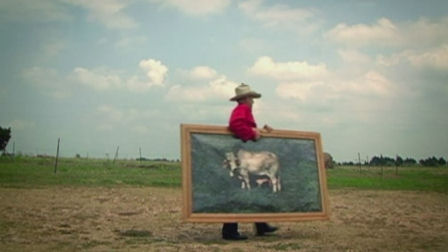
So far televised stories have included the farmer whose tame pet bull, Chance (so tame that it became a novelty, appearing on Letterman and the Superbowl half-time show), was dying, and was cloned as part of a Texas university research project. Or the 14 year old junior high student who has rationalised the futility of love, and sworn to never succumb to its “barbarian” ways. There was the politician who never lies, and the man who seeks bearded men in Utah to pose for photographs for his paintings of Biblical scenes. There was the photographer who stood and photographed while a woman was swept out to sea and drowned. Last week’s stunning edition dedicated an entire episode to the documentary a man in his twenties has made about his alcoholic parents, one a former pop star and now step-dad, the other his broken and conflicted mother.
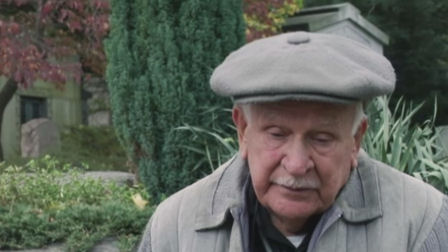
What makes it so special is the respect with which the subjects are treated. It’s not naive or unquestioning, but rather documentary that asks the questions that are relevant, but knows when to be quiet and listen. Talking to Joe, the 14 year old who has sworn off love, TAL demonstrates a degree of respect that I have never seen television show a teenager. It doesn’t patronise him, or suggest that he doesn’t know what he’s talking about. It shows his mother, Naomi, exasperated that she thinks he doesn’t know what he’s talking about. But it gives Joe a place to explain his thinking. When people are in ridiculous situations, Glass asks astonished questions. It’s an honest reaction, and it brings out more truth from the subject.
And the pictures. Perhaps driven by the fear of translating something they love to a medium they know is capable of brutally destroying radio, every shot is so beautifully constructed. The colour, the contrast, the juxtaposition, all breathtaking. You could pause it almost anywhere, print it out, and frame it. Ingeniously, the editing is frequently such that a person begins speaking long before you see them on screen. This degree of separation maintains the atmosphere of radio, where your imagination is still given room for creating images, despite those already present on screen.
Add in the superb music selection, and Ira Glass’s wonderful voice.
It’s deeply emotional, deeply intimate. It’s never naive, but prepared to listen. It maintains the profundity of the radio series, but is deservedly executed on a different medium. This is how good television can be.
Birdie Update
by John Walker on Apr.17, 2007, under Photos
It survived the night.
Well, that’s selling it rather short.
It recovered overnight.
I got up at 5.30am to do another feed, and it was spritely and enthusiastic. Then again at 9am. And then one last time before the Nice Lady came at 12pm. The last feed was the most exciting, demanded by the first signs of cheeping (since the screams – oh, the screams). Then there was hopping all around my room, and finally, sitting on my thumb.
The Nice Lady assured me that they have a habit of becoming tame very quickly, and then just as quickly becoming “untame” again. They will look after it in its own cage before transfering it to the aviary until it can fly, and then release it into the wild for another cat to eat. More pics.
Television: Drive – Fox
by John Walker on Apr.17, 2007, under Television

The first episode of Firefly ensured one thing: You were going to watch every other episode in the series, even if you had to kill close relatives. The first episode of Drive ensures, well, nothing.
Sharing a writer, Tim Minear was responsible for some of Firefly’s greatest episodes, with perhaps even a mature edge over Whedon’s wonderful dialogue. And so, sometimes a show gets measured from zero expectations upward, and other times from high expectations downward. It’s his own fault for having been so good. He’s not this time out.
It’s not bad, however. The idiotic concept is thus: there’s a secret, illegal road race across America, in which some participants take part willingly, while others are forced into the game to save kidnapped loved ones. They must solve clues and race to locations, desperately trying to not come last. So, er, a bit like The Amazing Race then, but pretend.
The Amazing Race is one of my naughty treats. 11 teams of two INARACEAROUNDTHEWORLD. It’s excellent nonsense television, as pairs of dimbos all fight at airports to get better flights, then shout at the confused locals in various countries, trying to find a clue box and then complete the appropriate challenge. As a Big Concept show, it’s fantastically executed, exec produced by Jerry Bruckheimer, and overblown to match. It also features the best creator/producer name of all time: Bertram Van Munster. Yes, it’s reality TV (or “unscripted TV” as the Americans attempt to sell it), and yes it’s populated mostly by morons, but the sheer scale of the project (now in its 11th season) is just so immense that it gets away with it.
Drive’s not that immense. Poor old Drive. Death by comparison. Again, it’s not that bad. It’s just not good. You’re given a huge cast of thinly sketched characters and asked to care about them from the very start. But why? When someone comes last, and is therefore charged with killing another character, you don’t care about the consequences for her, and you certainly don’t care about her victim. There’s the father/daughter team with Minear’s attempt to write a Whedon teenager and missing really quite embarrassingly badly. There’s three girls who after starring in two episodes are still completely anonymous, but the show’s website informs us they were brought together by Hurricaine Katrina – eurgh. There’s, um, oh blimey, there has to be… No, I forget. And finally there’s Cap’n Mal, Nathon Fillion. He’s the only character there’s been any attempt to flesh out, his wife kidnapped and his participation in the race an unwilling one. But Minear’s choice to use former Firefly colleague might have been a bit of a mistake.
Fillion is perfect in Firefly. His cowboy behaviour, dubious morality and quick temper (and trigger finger) make him by far the most interesting captain of any spaceship. Smart, loyal, and a master thief, Fillion nails it. In Drive he’s given almost nothing to do but complain, and then presumably because Minear is confusing the unwitting victim and loyal husband with his former gunslinging character, he then suddenly displays the ability to kidnap and interrogate people. Er. Perhaps we’re supposed to believe that his wife’s predicament will drive him to do anything to save her. But instead you get this jumble of a character who is, so far, rather disturbingly unlikeable.
American TV has a rather bad relationship with filming driving. With cars normally hooked on the back of camera trucks, the actor has no reason to look at the road in front, and so in response, doesn’t. It’s so hard to concentrate on what’s being said, rather internally screaming, “LOOK AT THE ROAD! YOU’RE GOING TO DIE!” Programmes like Homicide have rather cleverly gotten around this by, well, having the actor be driving. And it’s madness that more shows aren’t doing this. Drive has created some rather fabulous CGI techniques that allow the camera to drift between cars on the same road, and fade seamlessly through windows. It looks awesome. It also means all the driving is shot on green screen, and so we’re in the worst territory of all for eyes-right driving fu. You’d think a programme about driving, y’know, called “Drive”, would work a bit harder to have the drivers act like they’re, what was it again, ah yes, driving.
So episode three is about now, and I think I’m going to watch it. But I’m not sure why. Perhaps loyalty to Minear, since I know he can write excellent dialogue, even if he hasn’t written a decent line in the first two episodes. I think he gets one more go.
